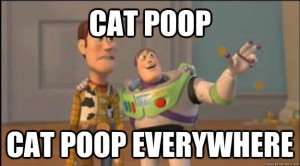What can possibly seem so important about your pets’ poop? Your dog stays in your backyard and your cat stays inside. Is it really necessary to have a fecal test done?


Fecal matters! And we are here to tell you all of the reasons why. Giardia, hookworms, roundworms, whipworms, tapeworms, coccidia, and even the unusual (but very scary) baylisascaris are among several of the common parasites that we see right here in Leesburg. Several of these parasites are contagious and/or zoonotic. (Zoonotic means they can be passed from animals to humans.) While using your monthly heartworm prevention helps protect against some parasites, there are occasionally circumstances in which a parasitic infection can not be helped. When we know what we are dealing with, we can also know what precautions to take at home, how to try to prevent re-infection, and how to protect your family while the infection is treated. Depending on the age and overall health of our pet, intestinal parasites can begin with mild symptoms that we easily overlook, until not only our own health is at risk, but our pet’s life is in danger. When you consider the cost of treating the infection, the risk to your family, the cost and effort of treating your yard, and the overall worry and stress for you and your pet, the cost of an annual (or semi-annual depending on your lifestyle) fecal test seems minimal.
Of the pets that are tested at Market Street Animal Clinic, we see an average of 10 to 20 pets that are infected with parasites each month. Of those infected, 11% were cats, 38% are younger than two years of age, and 76% were positive for a zoonotic parasite.We consider it our responsibility to arm you with the knowledge to make informed decisions for your pets’ health and your family’s safety. That being said, as a hospital, we have to control the possibility of spreading infectious diseases within our own walls and grounds. This means we will have requirements when your pet is being admitted to our hospital, even if it’s only for a few hours. If you or anyone you know has ever been admitted to a hospital, we’re sure you can appreciate this.
What are you and your pets’ risks? Discuss it with one of our amazing team members and for more information check out this post from the CDC.Parasites can be anywhere including, but not limited to, the soil in a house plant, the water in a puddle in your yard, the dog park, the floor of the pet store, the grass at the rest area where you travel. This is why the CDC recommends you err on the side of caution. Even if you think you may have a relatively low-risk life style, it is always best to have your pets’ feces checked.
Poop, there it is!


